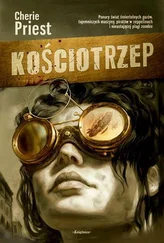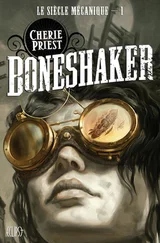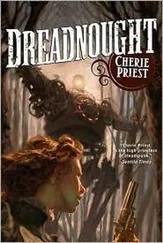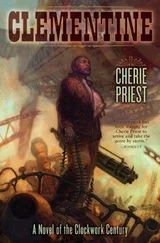With a bit of distance from the hospital, Gideon played the scene over in his head one second at a time, examining every detail as he walked a road he usually traversed in a horseless carriage belonging to Mary Todd Lincoln and driven by his old friend Harrison.
As he hiked, he reviewed his information. He assessed the details and considered the motives.
The intruders had absolutely planned to kill him. Why destroy the Fiddlehead only to let its creator survive to build another one? Men who didn’t know what such a machine could do probably wouldn’t know how preposterous the idea was: Gideon could build another Fiddlehead, yes, but not without a vast sum of money and several years at his disposal. His life’s work could not be conjured back into existence with the blink of an eye, but it could be conjured eventually.
So, yes, his life was in danger—that much was certain. But in danger from whom? He had assumed that the saboteurs were Southerners, but upon reflection that may not be correct. Regional accents were dead giveaways, in Gideon’s experience, and although one of the men might have come from the South, the other one was definitely a northeastern coastal resident.
Mind you, a Northerner still could’ve been hired by the CSA. Allegiances shifted across state lines every day, and mercenary loyalties came with price tags, not regional fidelity.
He couldn’t be sure. This made him unhappy, because he liked to be sure at all times, of as many things as possible. It made for better plans.
That having been said, he was sure that it was well over two miles back to the Lincoln house. His feet were cold and wet and he didn’t want to walk, but there wasn’t much choice. He had no immediate means of contacting anyone, and he carried no money for the purposes of flagging down a carriage and buying a ride.
He disliked money on general principle. It had its uses, but it seemed insubstantial—entirely too false. Little more than a promise on a piece of paper, written by dead men, miles and years away. Paper could burn, and paper could lie.
But the paper under his arm did not lie. It crinkled and crackled, urging him onward. Reminding him of what was at stake.
One foot in front of the other, he trudged along the road’s edge, every step leaving his toes a bit more numb. It wasn’t late, and the night still had room to get much colder; everything might freeze, he thought. If there was one single, solitary thing he missed about southern Alabama, it was the unimpressive winter weather.
(He missed it only fleetingly, and with some private disgust.)
There was never any question of where he might go now.
Home? Certainly not. It was even farther away than the Lincolns’ house at the edge of Capitol Hill. Besides, what would he do there? Sleep? Wait for morning, for a more reasonable hour to demand an audience?
He wished he had a bag or a satchel to hold the papers. Every few yards he adjusted them, squishing the unspooled document tighter and making sure nothing trailed on the ground behind him. He didn’t know how much he’d lost to the intruders’ interruption. Every surviving line was more precious than diamonds, but the cumbersome bundle drew stares from drivers and passengers, and from the men and women on their own trips home from a factory shift or an evening’s meal on the town.
A line of shiny black vehicles came roaring up toward him, brightly lit from within and spewing odd-smelling diesel fumes. All of them built with technology stolen—or, more likely, purchased—from the Texians, and spreading across the continent with speed that couldn’t bode well for the Confederacy. Texas tech was one of their last remaining advantages, and it, too, was slipping from their grasp.
This thought made him smile glumly as he plodded forward. His feet had become blocks of ice, and his hands gone likewise numb. His gloves were back at the old hospital in the basement somewhere, lying atop the Fiddlehead. Had the roof held, or had the dynamite brought the whole wing crashing down upon the calculation engine?
Gideon’s pace slowed, then picked up again. Worrying wouldn’t change whatever facts awaited him back there, and he couldn’t return to find out. Not until morning, he suspected, and maybe not even then.
If the Fiddlehead survived, then it must survive as a secret.
He squinted against brilliant pairs of front-facing lamps. As one of the cars passed him, he heard laughter within. And music. Someone had brought a violin, and someone else was playing a fife. Despite the cold, some of the carriages had left their windows down, and as they rolled past, Gideon smelled expensive food and perfume, and alcohol and tobacco.
Somewhere in the city, a ball or some other gala event had just ended, and a beautiful room filled with finely presented tables was emptying, which meant that Mrs. Lincoln might not be home yet. She often lingered at these things, partly by her own preference and partly because she served as her husband’s social eyes and ears, for the former president rarely left the house since his near-fatal injury at Ford’s Theatre. It was too trying, he said; too much trouble for other people to accommodate him. So he kept to his own home and his own grounds, which had been altered to better suit his needs.
Gideon kept his eyes open on the off chance Mrs. Lincoln’s buggy might pass by and he could flag her down, but it was not his lucky night. He walked the full distance, and by the time he reached the Lincoln estate his legs were heavier than lead.
So far as estates went, it was a surprisingly modest one—at least from the exterior; the inside was filled with expensive gifts collected over the years from dignitaries near and far. The house itself was a simple two-story home with two wings, and a lift inside, for the president could not ascend stairs without immense assistance. Also due to Lincoln’s mechanized chair, all the outdoor paths were paved.
Gideon almost tripped over the first walkway he passed. He might have cursed except that he was so relieved to have arrived. Lights burned up the hill at the homestead, giving him more than the nighttime sky or traffic to navigate by. He homed in on these electric torches, drawn like the moths and mosquitoes that hovered around the devices in a buzzing cloud. Up the half-dozen stairs he climbed, bypassing the ramp because it was less direct. Even after his long, cold hike, he was more impatient than tired.
The front door opened before he could knock, and there stood a confused-looking Nelson Wellers.
Mr. Lincoln’s personal physician was a gaunt young man with a cadaverous complexion. He was quick and capable, but he always wore the expression of someone carrying the weight of the world. Friendly enough despite his nervous disposition, he was well liked and trusted, even by Gideon, who had worked with him before. Together they had designed and perfected the ex-president’s wheeled chair, as well as some of the other tools that made life easier for the badly crippled politician.
“Gideon!” Nelson cried. “There you are—thank God!”
“Not a greeting I get every day.”
The doctor reached out and grabbed the scientist by the coat lapels, drawing him bodily inside and shutting the door behind them both. “We just heard about the explosion, and Ephraim said there was no sign of you out at the Jefferson building. I was on my way to … to … to see if I could find you, I suppose. Did you walk all the way back?”
“Yes.”
“Dear God, it’s freezing out there.”
“No, not quite.”
From the parlor doorway, a woman gasped. “Oh, Mr. Bardsley!”
Gideon threw her a nod, but did not make eye contact. “Polly,” he greeted the household lady-in-waiting, as Mrs. Lincoln often called her. One part maid, one part nurse, Polly Lockhart was a girl of mixed and indeterminate race—more white than otherwise. She was stout and small, much like the former first lady herself. She wrung her hands together, so they’d have something to do besides flutter.
Читать дальше










